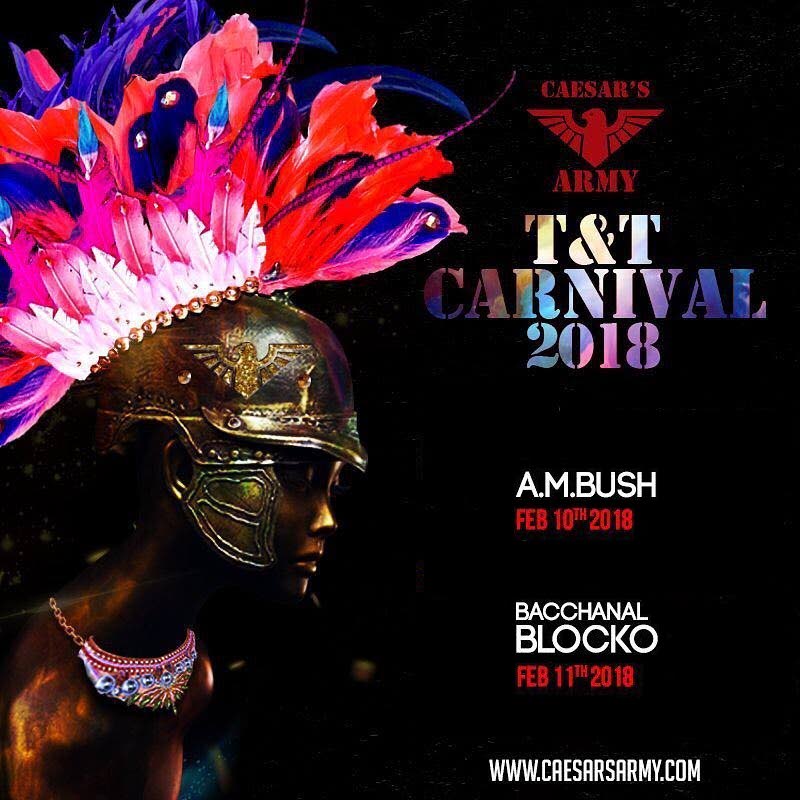Hail Caesar’s Army

Jules Sobion started planning and producing parties when he was still a high schooler attending St Mary’s College as a good way to socialise—and meet girls at the neighbouring St Joseph’s Convent in Port of Spain.
But his hobby became a passion, which led to the creation of Caesar’s Army— a Carnival brand known for throwing some of the hottest fetes. And after 25 years in the events promotions business, Sobion, 40, finally feels legitimised and recognised as a serious businessman, winning the 2017 EY Emerging Entrepreneur Award from the TT Chamber of Industry and Commerce.
“The award has boosted Caesar’s Army. It’s not something I expected and I’m hoping that this recognition from the Chamber of Commerce means that people—especially financial institutions—will pay attention to what a non-traditional business can do,” Sobion told Business Day.
Sobion has transformed the concept of the party experience, building on TT’s already well-established fete culture by doing something very simple—he listens to his customers and tailors his events to suit their needs.
“I’ve always wanted to revolutionise the entertainment industry. I think the experience for the customer and patron is most important,” he said.
And to be successful in this business, he says, you have to break the status quo a little bit—often by doing the simplest of things. In his case, the solution to throwing a good party is easy—keep your ears to the ground and listen to your patrons.

He gives the example of how Caesar’s Army changed its routine from the traditional J’Ouvert morning parade to the AM Bush party, now in its eighth year.
“The patrons— and even myself— were encountering hardships: no routes for bands, stormers, long waits, crime. They started to complain. Some of the loudest complaints came from women who were annoyed at the hassle of coming to J’Ouvert and then hurrying back home to come back out right after for Monday mas.”
So, Sobion did what was then considered unthinkable—particularly by his financial adviser—he moved the party from Carnival Monday to Carnival Saturday.
The finance guy thought he was crazy, potentially destroying the careful relationship the Army had built with its followers and losing out on the cash that would come with it. But Sobion stuck to his gut feeling that it would work out.
That first year, he remembers, had just over 100 people. But the next year, it grew to 1,000. And the year after that, 2,000. In 2017, there were over 3,000 people attending AM Bush.
“We rejuvenated and enhanced the experience for the customer,” he said. That gut feeling, he adds, is based on what someone, as a leader, truly stands for.
Just like his hero, legendary Roman leader, Gaius Julius Caesar, Sobion believes that even though you need to have a team that you trust, a leader still has to make decisions that others may not agree with, but maintain the fortitude to follow through.

“It’s based on what you truly stand for. The core essence of my well-being in terms of doing these events is listening to the patrons and creating the best experience possible. My experience, then, becomes more than a gut feeling. It becomes more calculated and precise because you are standing up for something you believe in. Yes, it was risky, but from my objective, it really was to complete my long-term vision.”
His modus operandi, then, was to stick with the idea, let it grow on people, and in time, they too will see the vision as well.
“Everything is a bit more long-term. We stick to it, let it grow on people, and in time, they will see that vision as well. Everything is a bit more long-term in this entrepreneurial world. It’s not a short-term business.”
Events promotions as a career—much less as an entrepreneurial endeavour— was never something financial institutions found sustainable, he says. This despite Caesar’s Army being one of the most recognisable names in Carnival, locally, regionally and increasingly, internationally.
The whole process of being an entrepreneur and getting that support to grow his business from the private sector, he says, was “very difficult.” Luckily, he had supportive parents, the late Keith Sobion, a former attorney general, and his wife, Judith. “My father was the first investor. He never saw many returns but I am very proud and grateful he invested in me because of where I am now.”

It was his mother, who regularly hosted parties and fashion shows, who first stoked his interest in event planning. As a young man, Sobion observed with fascination, the intricacies of setting up these lavish events. It was his light bulb moment, and his entrepreneurial spirit kicked in, inspiring him to throw his first social mixer house party for a bargain $10 per person.
The business of parties isn’t as easy as it looks, he says. “There’s a lot of work that people take for granted. It’s a whole production, not just setting up a bar on place and the stage another,” he said.
He gives credit to his team of “logistical geniuses” who transform his dreams into a practical reality. Caesar’s Army has seven full-time staff members—the generals, if you will, and a legion of contractors who work on making each production a spectacle.
Caesar’s Army started out producing its own events, so if a party lost money, the company lost money. Now, it has expanded to where they have clients who ask them to manage their events, something Sobion is happy to add as a new revenue stream. “This is a big thing for me, where people believe in our experience they want us to create it for them.”
For Carnival, Caesar’s Army will host five events, of which the crown jewel is the UWI All-Inclusive Fete. That’s a premium, but there are other affordable options, because Sobion believes in giving value for money.
“You have to be understanding of the times. Yes, it is a recession but I do think that people are yearning for experiences. We may have to make certain changes to our events, make them more economically affordable given the time,” he said.
TT’s survival as mecca of Carnival
Carnival, however, is boosted by the international clientele, he says, although he does note with some concern that TT is losing its grip as the Carnival capital of the world to other more organised Caribbean—and international— competition.

Caesar’s Army operates in several regional markets, including Jamaica and Barbados, with their attracting high-profile celebrities like Rihanna and Usain Bolt. He also operates in the US, where he has a registered business entity. As a net foreign exchange earner, Sobion has never had a challenge getting foreign exchange. Events then, also has the potential to boost foreign revenue earning, something he thinks is still untapped as the country continues to ignore the earning potential of the Carnival industry in favour of established sectors like oil and gas.
“We are fighting a battle—all Carnival stakeholders are. I don’t want to say it’s the negligence of TT but we are now facing competition from other carnivals who are taking the bikini and beads mas and the events, and packaging it with other experiences, like beaches and other elements of culture and tourism. Jamaica, for example, and Barbados, are very strong, and local and international patrons are seeing other carnivals as a potential,” he said. There are also diaspora markets like the US and the UK, which have carnival elements heavily influenced by TT.
What TT needs to do now is rejuvenate and enhance what it has always had, he says.
Quoting Machel Montano, Sobion said, “Nobody could fete like we. Nobody could play mas like we. These are parts of the culture that need to be brought back up to a level where it becomes an overall and holistic experience, not just bikini and beads or an events war. We need to be able to bring up the culture, the food, the home of soca. We can give the international clientele, even our domestic clientele a little more of the experience that is Carnival than what is being offered by other territories.”
The hard part, though, seems to be the difficulty in coming together as a unit. “I feel like everyone has an agenda but if the be all and end all is going to be TT, we need to come together to make it as formidable as it can be. Everyone has to reach a consensus if we are going to survive as the mecca of Carnival,” he said, acknowledging that there has been some collaboration, for example Caesar’s Army and Tribe launching a band together.
Government help would be nice, he said, but he can’t wait on them to come around.
“I’m seeing things on the verge of decline: tents, canboulay, even soca monarch. Outside of Carnival, parang is on the decline. They aren’t paying attention to these attributes and making them more powerful—so even outside of the Carnival season why is it a tourist can’t come to Trinidad for Christmas because there is something special like parang,” he said.
It makes him disappointed and saddened, he says, but he also sees opportunity.
“I am looking at all these things and I’m trying my best to either enhance them or revolutionise them so that they can become significant once again and become part of the culture. My world is very non-traditional. As an entrepreneur, I see it as my duty to bring back these elements to the stature they belong.”
It’s disappointing that the entities in charge can’t see what the country has to offer and use it as a form of empowerment, he said, but to him, it has reached a point where if someone wants to make a change they can’t wait on anyone.
“You have to innovate on your own.”

Comments
"Hail Caesar’s Army"